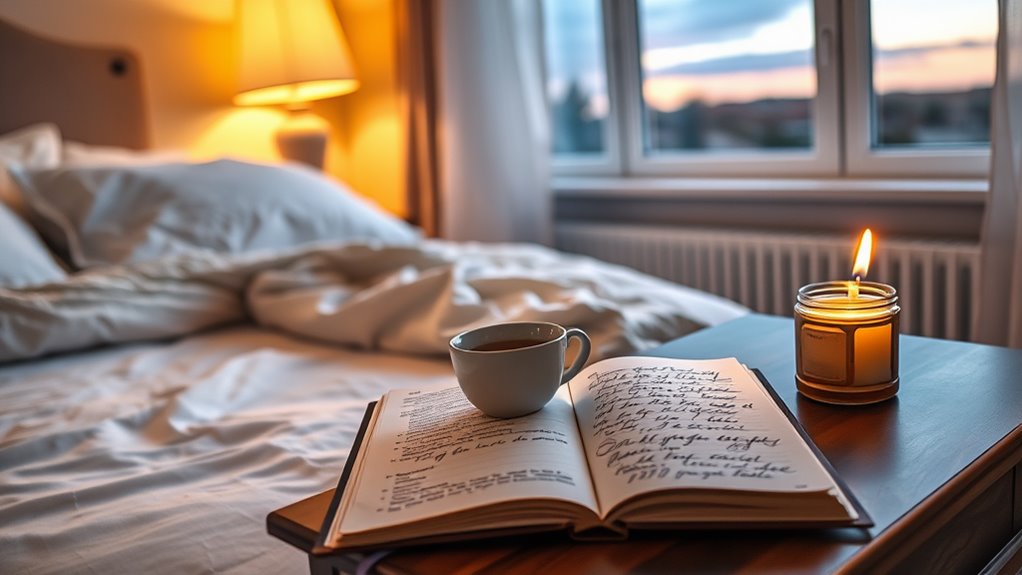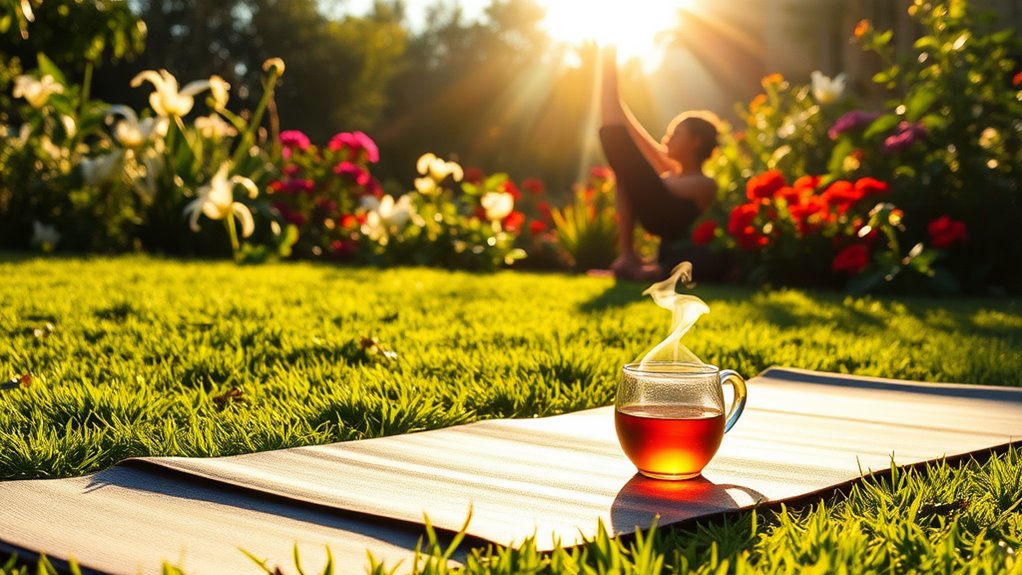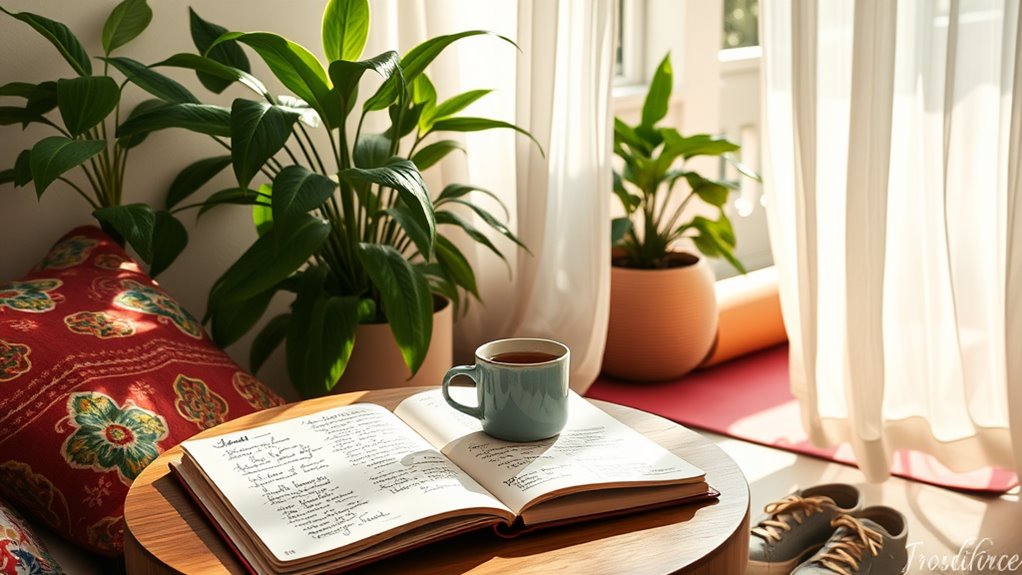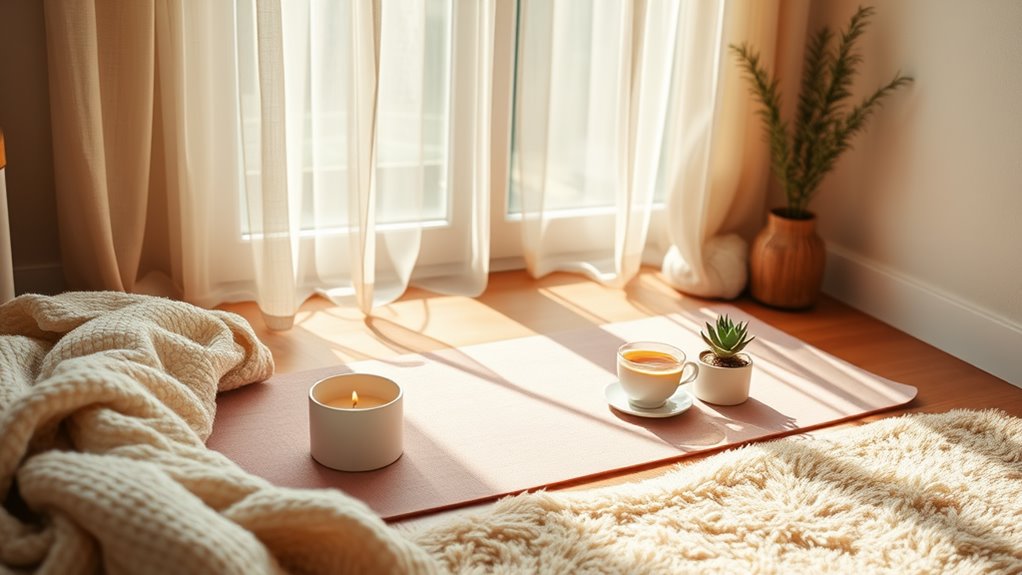A Simple 15-Minute Evening Routine That Will Change Your Night
To transform your nights, start a simple 15-minute evening routine. Begin with five minutes of deep breathing or meditation to unwind. Follow that with a quick decluttering of your space to create a calming environment. Spend five minutes journaling about your day, then wrap up with soothing music or reading a calming book. This routine not only signals your body that it’s time for sleep but also promotes relaxation. Discover more ways to enhance your evening further.
Key Takeaways
- Begin your routine with five minutes of deep breathing or meditation to calm your mind and reduce stress.
- Dedicate five minutes to journaling, reflecting on your day and writing down thoughts to promote mental clarity.
- Engage in a soothing activity for five minutes, such as reading a non-stimulating book or listening to calming music.
- Create a relaxing sleep environment by decluttering, adjusting room temperature, and using blackout curtains for optimal comfort.
- Set reminders for your evening routine and prepare for the next day to maintain consistency and reduce morning stress.
The Importance of a Structured Evening Routine
While you might think a chaotic evening is harmless, establishing a structured evening routine can greatly enhance your overall well-being. By committing to evening routines, you signal your body that it’s time to unwind, leading to improved sleep quality and more productive mornings. Engaging in evening routines can also lead to a sense of peace and tranquility.
These routines encourage independence, foster confidence, and reduce anxiety by creating a predictable environment. Furthermore, they promote healthy habits, integrating self-care activities into your nightly ritual. Predictable routines can also help children practice balancing tasks, which is essential for developing executive function skills.
You’ll find that structured evenings enhance your executive function skills, requiring effective planning and organization. Ultimately, a well-crafted evening routine not only prepares you for tomorrow but also cultivates a sense of achievement, making each night a stepping stone toward greater mastery in your life.
Calming Techniques to Wind Down
As you shift from the busyness of the day to a more tranquil evening, incorporating calming techniques can greatly enhance your ability to unwind.
Here are three effective practices to contemplate:
-
Deep Breathing: Try the 4-7-8 method to reduce stress and lower blood pressure. Just a few minutes can work wonders, as deep breathing techniques have been shown to activate the body’s relaxation response.
-
Meditation: Even five minutes of focused meditation can clear your mind and foster relaxation. This simple practice is known to reduce stress and promote emotional well-being.
-
Journaling: Reflect on your day and process your thoughts by jotting down emotions or gratitude lists. Creating threshold rituals at the end of your day can also signal your mind to shift gears towards restful sleep.
Integrating these techniques into your evening routine not only prepares your mind for restful sleep but also cultivates a sense of peace, allowing you to transition smoothly into the night ahead.
Creating a Relaxing Sleep Environment
To create a relaxing sleep environment, start by decluttering your bedroom; a tidy space can help your mind unwind. Next, adjust your room temperature to between 60°F and 67°F to promote deeper sleep. A cool bedroom aids in falling and staying asleep. Incorporating simple nighttime rituals can also enhance your ability to relax and prepare for sleep. These small changes can make a big difference in how quickly you fall asleep and how well you rest through the night.
Declutter Your Bedroom
A clutter-free bedroom can transform your sleep environment, making it more relaxing and inviting. To achieve this, focus on these three key actions:
-
Clear the Space: Gather items that don’t belong in your bedroom and remove them. Keep floors clear except for furniture, and guarantee no food or dishes linger. A calming environment is essential for promoting better sleep.
-
Organize Smartly: Group similar items together and assign a specific home for each. Use labeled containers for easy access, prioritizing a tidy nightstand and dresser. Create designated spots for clothing and personal items to further enhance organization.
-
Maintain the Serenity: Schedule regular decluttering sessions and develop habits like putting items away after use. This keeps your sanctuary peaceful and promotes restful sleep, setting the stage for your evening routine.
Optimal Room Temperature
Finding the right room temperature can greatly enhance your sleep quality, so it’s essential to create an environment that feels comfortable. Aim for a temperature between 60°F and 67°F (15°C to 19°C) for ideal sleep. This range helps lower your body heat, facilitating a smoother shift into sleep stages like REM and slow-wave.
Consider seasonal adjustments: cooler settings in winter and slightly warmer in summer, always tailored to your comfort. Guarantee good air quality by circulating fresh air and controlling humidity levels, as both can greatly impact sleep. Prioritizing the importance of sleep can further improve your overall well-being and daily performance.
Use blackout curtains and breathable bedding to maintain a serene atmosphere. By mastering your sleep environment, you’ll pave the way for restorative rest every night.
Engaging in Soothing Activities
As your evening winds down, consider engaging in soothing activities that help calm your mind.
Reading a few pages of a good book or listening to gentle music can create a peaceful atmosphere.
You might even explore a creative hobby that brings you joy and relaxation, setting the stage for a restful night.
Reading Before Bed
Reading before bed creates a soothing atmosphere that can greatly enhance your nightly routine. It’s a simple yet powerful way to improve sleep quality and reduce stress.
Here are three tips to maximize your bedtime reading:
-
Choose Non-Stimulating Content****: Opt for fiction or books with a calm narrative to distract from daily stressors without causing excitement.
-
Create a Comfortable Environment: Make sure your reading area is cozy and well-lit, signaling to your body that it’s time to wind down.
-
Establish Consistency: Stick to a regular reading schedule to signal your brain that it’s time to sleep, enhancing both sleep duration and quality.
Incorporating reading into your routine can transform your nights for the better.
Soothing Music Choices
Soothing music can be a powerful addition to your evening routine, enhancing relaxation and preparing your mind for sleep. By incorporating specific genres and artists, you can create an ideal ambiance. Consider the following options:
| Music Type | Recommended Artists | Benefits |
|---|---|---|
| Classical Music | Erik Satie | Promotes calm atmosphere |
| Instrumental | Ludovico Einaudi | Fosters a soothing environment |
| Nature Sounds | Ólafur Arnalds | Enhances relaxation |
| Slow BPM Music | Max Richter | Induces sleep |
| Meditation Music | Various (binaural beats) | Supports deep relaxation |
Experiment with volume control and consistency to maximize effects. Pair your music with yoga or meditation for an enriched experience. Master these techniques to elevate your nightly routine.
Creative Hobbies Exploration
How can engaging in creative hobbies transform your evening routine? By immersing yourself in soothing activities, you can greatly enhance your mental wellness and prepare for restful sleep.
Here are three creative pursuits to explore:
-
Visual Arts: Try painting or drawing to experiment with colors and textures, fostering relaxation while engaging your mind and body.
-
Crafting for Relaxation: Knitting or crocheting can provide repetitive motions that soothe anxiety and promote a calming flow state.
-
Mandalas for Insomnia: Create intricate mandalas as a therapeutic way to unwind, reducing insomnia and enhancing mindfulness.
Incorporating these activities into your evening routine not only helps manage stress but also bridges the mind-body connection, setting the stage for a peaceful night.
Managing Your Time Effectively
Although managing your time effectively can feel overwhelming, implementing a few key techniques can greatly enhance your productivity.
Start by setting SMART goals—specific, measurable, attainable, relevant, and time-bound—to sharpen your focus. Prioritize your tasks, tackling the most important ones first to maximize your output.
Embrace single-tasking; concentrating on one task boosts quality and minimizes errors. Use time boxing to allocate specific slots for each task, avoiding distractions and multitasking.
Consider applying the Pomodoro Technique, working in 25-minute intervals followed by short breaks to sustain energy.
Finally, leverage project management tools to stay organized and track your progress. By mastering these techniques, you’ll not only manage your time better but also increase your effectiveness.
Incorporating Relaxation and Meditation
As you wind down for the evening, incorporating relaxation and meditation techniques into your routine can greatly enhance your overall well-being.
These practices help reduce stress, improve sleep quality, and boost mental clarity for the next day.
Consider integrating these three techniques:
-
Mindfulness Meditation: Clear your mind and let go of the day’s worries by focusing on your breath.
-
Breathing Exercises: Try the 4-7-8 technique to promote deep relaxation. Inhale for 4 seconds, hold for 7, and exhale for 8.
-
Progressive Muscle Relaxation: Tense and relax each muscle group to release physical tension and prepare your body for sleep.
Tips for Maintaining Your Evening Routine
Creating a calming evening atmosphere is only the beginning; maintaining your routine is key to reaping its benefits. Start by setting timely reminders to signal the beginning of your routine. Use technology to automate tasks, like dimming lights, ensuring a seamless shift into relaxation.
Stay flexible; life happens, and it’s essential to adapt while keeping a core structure intact. Track your progress with a journal or app for accountability, and review your routine regularly, adjusting as needed.
Prepare for the next day by organizing belongings and planning meals to reduce morning stress. Finally, embrace a digital detox by silencing notifications and minimizing device use, fostering an environment conducive to rest and rejuvenation.
Frequently Asked Questions
Can I Adjust My Routine Based on Daily Changes?
Think of your routine as a flowing river, adapting to the landscape. You can adjust it daily, allowing it to reflect your mood or circumstances, ensuring it remains a source of tranquility and balance.
What if I Struggle With Meditation Techniques?
If you struggle with meditation techniques, don’t worry. Start small and focus on your breath. Experiment with different methods, like body scans or gratitude meditation, to find what resonates best with you. Consistency will strengthen your practice.
How Can I Involve Family in My Evening Routine?
To involve your family in your evening routine, assign tasks, share stories, or enjoy interactive games together. Foster connection through shared goals, establish consistent bedtime rituals, and embrace mindfulness practices for a harmonious atmosphere.
Are There Specific Scents That Aid Relaxation?
Did you know pleasant scents can enhance memory recall by up to 65%? Incorporate lavender, chamomile, or sandalwood into your relaxation routine; they’re proven to lower anxiety, improve mood, and promote better sleep quality.
What Should I Do if I Can’t Sleep After My Routine?
If you can’t sleep after your routine, get out of bed. Engage in a calming activity, like reading or meditating, until you feel drowsy again. Avoid screens, and keep the lights dim to encourage sleepiness.
References
- https://www.sleep.com/sleep-health/15-minutes-extra-sleep
- https://balancethroughsimplicity.com/why-a-great-evening-routine-can-save-you-time-and-stress-for-the-next-day/
- https://parentlightly.com/the-15-minute-bedtime-routine-that-will-change-the-way-you-sleep/
- https://www.cag.edu.tr/uploads/site/lecturer-files/387-2-english-vocabulary-in-use-pre-intermediate-and-intermediate-redman-2017-4th-264p-sayfalar-silindi-3br9.pdf
- https://www.healthline.com/health/nighttime-routine
- https://pathways.org/evening-routines
- https://www.personatalent.com/productivity/how-to-create-a-productive-evening-routine/
- https://www.aveeno.com/journal/kids/effective-bedtime-routine-for-kids-to-smoothly-transition-to-the-school-day
- https://www.fromjenn.com/blog/evening-routine
- https://www.sleepfoundation.org/sleep-hygiene/bedtime-routine-for-adults





